新编英语教程5_unit1_教学课件
新编实用英语第三版综合教程-Unit-1-Hello--Hi!PPT课件

Section Ⅰ
Section Ⅱ
Being All Ears
2021/3/12
Section Ⅲ
Section Ⅴ
Appreciating Culture Tips
Section Ⅳ
Maintaining a Sharp Eye
Trying Your Hand
3 Unit | One
Section Ⅰ Talking Face to Face
1. Etiquette of meeting and introducing people 2. Etiquette of exchanging business cards 20213/3./1B2 asic sentence structures
2 Unit | One
Contents
Talking Face to Face
2) Exchanging Business Cards
A: How do you do, Prof. White? Glad to meet you.
B: How do you do, Prof. Wang? Glad to meet you, siness card.
教授
4) Meeting People Again A: Hello, Professor Waters. How are you these days? B: Fine, thanks. And you? A: I'm fine, too.
夫人
2021/3/12
5) Saying Goodbye
A: Thank you for the nice party, Mrs. Lin. We really had a
全新版大学英语(第二版)综合教程 第5册 Unit 1 One Writer’s Beginnings

Chronology of Mark Twain’s Life
1835 Born in Florida, Missouri. 1847 Father dies, leaving family in difficult circumstances. 1851 Begins work as a journeyman printer with the
The Wolf and the Lamb
Once upon a time a wolf was lapping at a stream. When he looked up, he saw a lamb drinking a little lower down.
“There’s my supper,” he thought. “I will find some excuse to catch it.” Then he called out to the lamb, “How dare you muddle the water?” “No, master,” said the lamb. “I cannot muddle your water because it runs down from you to me.”
3. Write a short essay about your first favorite book and exchange your essay with your classmates.
Listening Comprehension
Directions: Here are two stories from Aesop’s Fables. Have you ever read them before? Listen to either of them and talk with your fellow students about what you have learned from them.
李观仪《新编英语教程(5)》(第3版)学习指南【词汇短语+课文精解+全文翻译+练习答案】

李观仪《新编英语教程(5)》(第3版)学习指南【词汇短语+课文精解+全文翻译+练习答案】目录Unit 1 一、词汇短语 二、参考译文 三、课文注释 四、练习答案Unit 2 一、词汇短语 二、参考译文 三、课文注释 四、练习答案Unit 3 一、词汇短语 二、参考译文 三、课文注释 四、练习答案Unit 4 一、词汇短语 二、参考译文 三、课文注释 四、练习答案Unit 5 一、词汇短语 二、参考译文 三、课文注释 四、练习答案Unit 6 一、词汇短语 二、参考译文 三、课文注释 四、练习答案Unit 7 一、词汇短语 二、参考译文 三、课文注释 四、练习答案Unit 8 一、词汇短语 二、参考译文 三、课文注释 四、练习答案Unit 9 一、词汇短语 二、参考译文 三、课文注释 四、练习答案Unit 10 一、词汇短语 二、参考译文 三、课文注释 四、练习答案Unit 11 一、词汇短语 二、参考译文 三、课文注释 四、练习答案Unit 12 一、词汇短语 二、参考译文 三、课文注释 四、练习答案弘博学习网————各类考试资料全收录内容简介《新编英语教程(第3版)学习指南》按照原教材的课次进行编写,每单元涉及单元语法、词汇短语、参考译文、课文精解以及练习答案等内容,旨在帮助学生更好、更高效地学习和掌握教材中的重点及难点知识,具有很强的针对性和实用性。
在编写过程中,该书力求突出重点,答疑难点,语言言简意赅,讲解深入浅出,希望它能得到广大英语专业学生和英语自学者的喜爱和认可。
弘博学习网————各类考试资料全收录Unit 1一、词汇短语Text I1clumsy [5klQmzi] adj. moving or doing things in a very awkward way 笨拙的,拙劣的:I spilt your coffee. Sorry—that was clumsy of me.我把你的咖啡弄洒了。
新编英语教程5paraphrase unit1-7
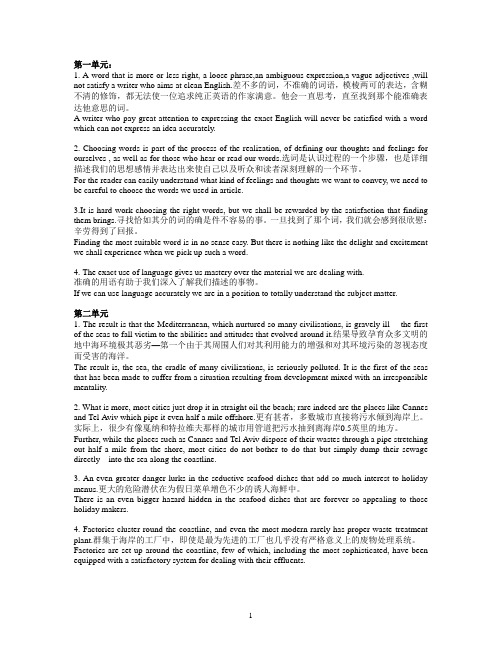
1.A word that is more or less right, a loose phrase,an ambiguous expression,a vague adjectives ,will not satisfy a writer who aims at clean English.差不多的词,不准确的词语,模棱两可的表达,含糊不清的修饰,都无法使一位追求纯正英语的作家满意。
他会一直思考,直至找到那个能准确表达他意思的词。
A writer who pay great attention to expressing the exact English will never be satisfied with a word which can not express an idea accurately.2. Choosing words is part of the process of the realization, of defining our thoughts and feelings for ourselves , as well as for those who hear or read our words.选词是认识过程的一个步骤,也是详细描述我们的思想感情并表达出来使自己以及听众和读者深刻理解的一个环节。
For the reader can easily understand what kind of feelings and thoughts we want to convey, we need to be careful to choose the words we used in article.3.It is hard work choosing the right words, but we shall be rewarded by the satisfaction that finding them brings.寻找恰如其分的词的确是件不容易的事。
(完整版)新编英语教程5册Unit1的答案
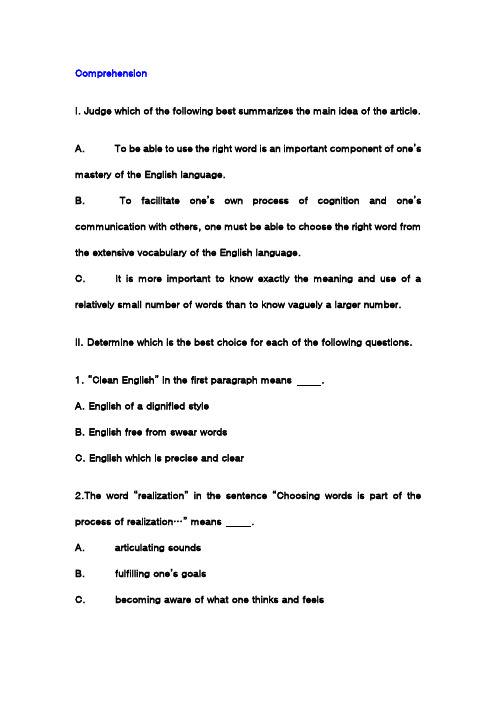
ComprehensionI. Judge which of the following best summarizes the main idea of the article.A. To be able to use the right word is an important component of one’s mastery of the English language.B. To facilitate one’s own process of cognition and one’s communication with others, one must be able to choose the right word from the extensive vocabulary of the English language.C. It is more important to know exactly the meaning and use of a relatively small number of words than to know vaguely a larger number.II. Determine which is the best choice for each of the following questions.1. “Clean English” in the first paragraph means .A. English of a dignified styleB. English free from swear wordsC. English which is precise and clear2.The word “realization” in the sentence “Choosing words is part of the process of realization…” means .A. articulating soundsB. fulfilling one’s goalsC. becoming aware of what one thinks and feels3. The example given in para. 3 of a man searching for the right word for his feelings about his friend illustrates the function words perform in .A. defining out thoughts and feelings for ourselvesB. defining our thoughts and feelings for those who hear usC. both A and B4. The word “cleanly” in the last sentence means .A. squarelyB. clearlyC. neatly5.The examples of the untranslatability of some words given in para. 11 best illustrate which sentence of the paragraph?A. The first sentence.B. The second sentence.C. The third sentence.III. Answer the following questions.1. Which sentence in the first paragraph establishes the link between the driving of a nail and the choice of a word?2. What does the word “this” in sent ence 1, para. 2, refer to?3. Do you agree with the author that there is a great deal of truth in the seemingly stupid question “How can I know what I think till I see what I say”?Why or why not?4. Explain why the word “imprison” in the example given in para. 9, though not a malapropism, is still not the right word for the writer’s purpose.5. What is the difference between “human” and “humane”? And the difference between “human action” and “humane action”, and also that between “human killer” and “humane killer”?6. What does the word “alive” in the sentence “a student needs to be alive to these differences” (para. 9) mean?7. Why is it difficult and sometimes even impossible to translate a word from one language into another as illustrated in para. 11? Supply some such examples with English and Chinese.8. The writer begins his article with an analogy between the unskilled use of the hammer and the improper choice of words. Identify the places where the analogy is referred to in the rest of the article.Language WorkI. Read the following list of words and consider carefully the meaning of each word. Then complete each of the sentences below using the correct form of an appropriate word from the list.Creep Loiter March Meander Pace Patrol Plod Prowl Ramble Roam SaunterShuffle Stagger Stalk Step Stride Strut Stroll Toddle Tramp Tread Trudge Walk1. After the maths examination Fred, feeling exhausted, across the campus.2. The soldiers reached their camp after 15 miles through the deep snow.3. It is pleasant to in the park in the evening.4. After the cross-country race Jack to the changing room.5. Last night when he sleepily to the ringing telephone, he accidentally bumped into the wardrobe.6. We saw him towards the station a few minutes before the train’s departure.7. The old couple through the park, looking for a secluded bench to sit on and rest.8. The newly-appointed general about the room like a latter-day Napoleon.9. Peter whistled happily as he along the beach.10. These old people liked to about the antique ruins in search of a shady picnic spot.11. Many tourists about the mall, windowshopping.12. We were fascinated by the view outside the room----a beautiful verdant meadow and brooks through it.13. Mary used to about the hills and pick wild flowers for her mother.14. Eager to see the pony in the stable, the children down the staircase, their hearts pounding violently.15. The lion had the jungle for a long time before it caught sight of a hare.16. My brother began to when he was ten months old.17. The farmers often let their horses freely in the meadow so that they could eat their fill of grass.18. The patrols were along through the undergrowth when the bomb exploded.19. The thugs were reported to be the streets for women workers who were on their way home after the afternoon shift.20. The first-year students not only learned how to , they were also taught how to take aim and shoot when they had military training.21. Sometimes Tom, our reporter, would up and down the study, deep in thought.22. When he was Third Street, Fred found the little match girl lying dead at the street corner.23. Secretaries hated seeing their new manager in and out of theoffice without even casting a glance at them.24. Mother asked us to lightly so as not to wake Granny.25. The refugees for miles and miles all day hunting for a place to work.26. When the pop singer out of the car, his fans ran to him, eager to get his autograph.27. The laborers on their way home after working in the plantation the whole day.28.The lion was feeling pretty good as he (A) through the jungle. Seeing a tiger, the lion stopped it.“Who is the King of the jungle?” the lion demanded.“You, O lion, are the King of the jungle,” replied the tiger.Satisfied, the lion (B) on, until he came across a large, ferocious-looking leopard.“Who is the King of the jungle?” asked the lion, and the leopard bowed in awe. “You, mighty lion, you are the King of the jungle,” it said humbly and (C) off.Feeling on top of the world, the lion proudly (D) up to a huge elephant an d asked the same question. “Who is the King of the jungle?”Without answering, the elephant picked up the lion, swirled him round in the air, smashed him to the ground and jumped on him.“Look,” said the lion, “there’s no need to get mad just because you didn’t know the answer.”II. Make a list of more specific words for each of the following general terms. For example, for WALK, you could list stride, stroll, saunter, plod, toddle and so on. Give sentences to illustrate how the words may be used.1. SAY2. SEE3. BEVERAGE4. EXCITEMENT5. DELIGHT6. SKILFULIII. In the following sentences three alternatives are given in parentheses for the italicized words. Select the one which you think is most suitable in the context.1. A clumsy (heavy, stupid, unskillful) workman is likely to find fault with his tools.2. As John was a deft (skillful, clever, ready) mechanic, he was hired by the joint-venture in no time.3. The writer made a point of avoiding using loose(vague, unbound, disengaged) terminology in his science fiction.4. We didn’t appreciate his subtle(delicate, tricky, profound) scheme to make money at the expense of the customers.5. Annie Oakley became famous as one of the world’s most precise (accurate, scrupulous, rigid) sharpshooters.6. The government in that newly-independent country has decided to make ashift (alteration, turn, transference) in its foreign policies.7. Misunderstanding arose on account of the vague(undetermined, confused, ambiguous) instructions on the part of the manager.8. If soldiers do not pay scrupulous (exact, vigilant, conscientious) attention to orders they will not defeat the enemy.9. In some areas, the virgin forest has been cut through ignorance (blindness, want of knowledge, darkness) of the value of trees.10. Since many pure metals have such disadvantages (harm, unfavourableness, drawbacks) as being too soft and being liable to rust too easily, they have little use.11. My colleague, Mr. Hill, has a small but well-chosen library, where it is said he spends most of his spare time cultivating(nourishing, tilling, developing) his mind.12. If you think photography is my hobby, your belief is quite mistaken (fraudulent, erroneous, deceitful).13. What appears to the laymen as unimportant (minute, trivial, diminutive) and unrelated facts is often precious to the archaeologist.14. The lounge has a seating capacity of 30 people but it is too dark (dim, dingy, gloomy) to read there.15. These career-oriented women are used to flexible (adaptable, willowy, docile) working hours in the office.16. Only experts with a professional eye can tell the fine(fair, pleasant,subtle) distinction between the two gems.17. The goose quill pen has a great sentimental (tender, emotional, soft) appeal to Emily as it was a gift from her best friend.18. Being thoughtful of and enthusiastic towards others is the essence (gist, kernel, quintessence) of politeness.19. When Iraq destroyed some of its nuclear and chemical weapons, it acted under coercion (repression, concession, compulsion).20. My uncle’s oft-repeated anecdotes of his adventures in Africa were fascinating (catching, pleasing, absorbing ) to listen to.IV. Give one generic term that covers each of the following groups of words.1. artificer, turner, joiner, carpenter, weaver, binder, potter, paper-cutter2. volume, brochure, pamphlet, treatise, handbook, manual, textbook, booklet3. painter, sculptor, carver, poet, novelist, musician, sketcher4. grin, smirk, beam, simper5. donation, subscription, alms, grant, endowment6. bandit, poacher, swindler, fraud, embezzler, imposter, smuggler7. nibble, munch, devour, gulp8. drowse, doze, slumber, hibernate, coma, rest, nap9. manufacture, construct, weave, compose, compile10. ancient, antique, old-fashioned, obsolete, archaic11. slap, tap, pat, thump, whack12. alight, descend, dismount, disembarkV. Fill in each blank with an appropriate word.In discussing the relative difficulties of analysis which the exact and inexact sciences face, let me begin with an analogy. Would you agree that swimmers are (1) skilful athletes than runners (2) swimmers do not move as fast as runners? You probably would (3) . You would quickly point out (4) water offers greater (5) to swimmers than the air and ground do to (6) Agreed, that is just the point. In seeking to (7) their problems, the social scientists encounter (8) resistance than the physical scientists. By (9) I do not mean to belittle the great accomplishments of physical scientists who have been able, for example, to determine the structure of the atom (10) seeing it. That is a tremendous (11) yet (12) many ways it is not so difficult as what the social scientists are expected to (13) . The conditions under which the social scientists must work would drive a (14) scientist frantic. Here are five of (15) conditions. He can perform (16) experiments; he cannot measure the results accurately; he (17) control the conditions surrounding (18) experiments; he is of the expected to get quick results(19) slow-acting economic forces; and he must work with people,(20) with inanimate objects…VI. Following Warner’s model of establishing an analogy between two dissimilar things, write a passage, discussing the learning of a foreign language. You are supposed to use an analogy to help you explain. For instance, you may compare the learning of a foreign language to that of swimming, bike-riding, etc.UNIT 1 TEXT 1Exercises KeysComprehension:I. B ;II. 1.C 2.C 3.C 4.A 5.C ;III. 1. “So with language; …firmly and exactly.”2. Getting the word that is completely right for the writer’s purpose.3. Yes, I do. It sounds irrational that a person does not know what he himself thinks before he sees what he says. But as a matter of fact, it is quite true that unless we have found the exact words to verbalize our own thoughts we can never be very sure of what our thoughts are; without words, our thoughts cannot be defined or stated in a clear and precise manner.4. “Malapropism” means the unintentional misuse of a word by confusing it with one that resembles it, such as human for humane, singularity for singleness. But the misuse of “imprison” is a different case. It is wronglychosen because the user has failed to recognize its connotation.5. human=of, characterizing, or relating to manhumane=characterized by kindness, mercy, sympathyThus: human action=action taken by man; humane action=merciful action; human killer=person that kills humans ; humane killer=that which kills but causes little pain6. sensitive, alert7. Those are words denoting notions which are existent only in specific culture, not universally shared by all cultures. English words difficult to be turned into Chinese: privacy, party, lobby (v.), etc. Chinese words difficult to be turned into English: 吹风会,粽子,五保户,etc.8. “We don’t have to look far afield to find evidence of bad carpentry.”“It is perhaps easier to be a good craftsman with wood and nails than a good craftsman with word s.”“A good carpenter is not distinguished by the number of his tools, but by the craftsmanship with which he uses them. So a good writer is not measured by the extent of his vocabulary, but by his skill in finding the ‘mot juste’, the word that will hit t he nail cleanly on the head.”Language Work:I. 1. shuffled/trudged 2. trudging 3. stroll 4. staggered 5. staggered 6. striding 7. strolled 8. strutted 9. sauntered/strolled 10. ramble/roam 11.loitered 12. meandering 13. roam 14. crept 15. prowled 16. toddle 17. roam 18. creeping 19. prowling 20. march 21. pace 22. patrolling 23. stalking 24. tread 25. tramped 26. stepped 27. plodded 28. A. prowled/strutted B. strolled/sauntered C. walked/crept D. marched/struttedII.1.SAY: speak, tell, declare, pronounce, express, state, argue, affirm, mention, allege, recite, repeat, rehearse2. SEE: behold, look at, glimpse, glance at, view, survey, contemplate, perceive, notice, observe, discern, distinguish, remark, comprehend, understand, know3. BEVERAGE: liquor, wine, beer, tea, coffee, milk drink, soft drink4. EXCITEMENT: agitation, perturbation, commotion, disturbance, tension, bustle, stir, flutter, sensation5. DELIGHT: joy, gladness, satisfaction, charm, rapture, ecstasy, pleasure, gratification6. SKILFUL: apt, ingenious, handy, ready, quick, smart, expert, capable, able, gifted, talented, dexterous, cleverIII. 1. clumsy----unskillful 2. deft----skillful 3. loose----vague 4. subtle----tricky 5. precise----accurate 6. shift----alteration 7. vague----ambiguous8. scrupulous----conscientious 9. ignorance----want of knowledge 10. disadvantages----drawbacks 11. cultivation----developing 12.mistaken----erroneous 13. unimportant----trivial 14. dark----dim 15. flexible----adaptable 16. fine----subtle 17. sentimental----emotional 18. essence----quintessence 19. coercion----compulsion 20. fascinating----absorbingIV. 1. craftsman 2. book/publication 3. artist 4. smile 5. contribution 6. law-breaker 7. eat 8. sleep 9. make 10. old 11. hit 12. get offV. 1. less 2. because/since/as 3. not 4. that 5. resistance 6. runners 7. solve 8. greater/more 9. that 10. without 11. achievement/feat 12. in 13. do 14. physical 15. those 16. few 17. cannot 18. the 19. with 20. not。
新编英语教程(第三版)第一册第五课课件
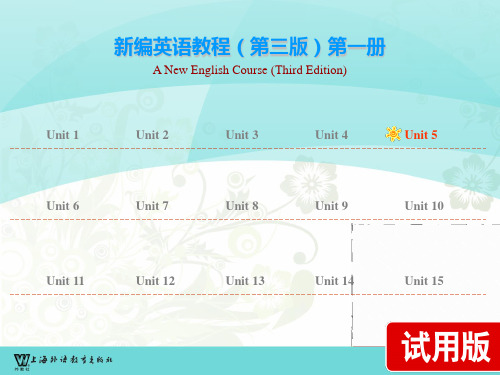
A New English Course (Third Edition)
Unit 1
Unit 2
Unit 3
Unit 4
Unit 5
Unit 6
Unit 7
Unit 8
Unit 9
Unit 10
Unit 11
Unit 12
Unit 13
Unit 14
Unit 15
Unit 5 Save Our Heritage
新编英语教程(第三版)第一册
Unit 5 Save Our Heritage
Lead-In
LSP
Dialogue
Role Play
Reading
Exercises
Language Structures Preparatory Questions Practice I
Practice II Practice III
新编英语教程(第三版)第一册
Unit 5 Save Our Heritage
Lead-In
LSP
Dialogue
Role Play
Reading
Exercises
docent: (AmE) someone who guides visitors through a museum, church, etc.
新编英语教程(第三版)第一册
Unit 5 Save Our Heritage
Lead-In
LSP
Dialogue
Role Play
Reading
Exercises
riffraff: an insulting word for people who are noisy, badlybehaved, or of low social class e.g.: Don’t bring any riffraff into my house! 别把不三不四的人领到我家来!
新编英语教程(第三版)第一册第五课课件

Unit 5 Save Our Heritage
Lead-In LSP Dialogue Role Play Reading Exercises
Larry: Excuse me. Hi. Rebecca: Hi.
Larry: Uh, I’m Larry Daley. I’ve got a job interview with Cecil Fredericks.
docent: (AmE) someone who guides visitors through a museum, church, etc.
新编英语教程(第三r Heritage Lead-In LSP Dialogue Role Play Reading Exercises
Rebecca: Will do, sir. McPhee: Thank you. Rebecca: Dr. McPhee, the museum director.
新编英语教程(第三版)第一册
Unit 5 Save Our Heritage Lead-In LSP Dialogue Role Play Reading Exercises
He asks visitors to keep off the exhibits.
新编英语教程(第三版)第一册
Unit 5 Save Our Heritage Lead-In LSP Dialogue Role Play Reading Exercises
Script
新编英语教程(第三版)第一册
Lead-In LSP Dialogue Role Play Reading Exercises
Rebecca: 26th. Larry: 26th.
McPhee: (claps hands): Eh! Please don’t touch the exhibits! Riffraff. Miss Hutman, I cannot tolerate this type of chaos. I mean, this is a museum, not a...a-a-a... Do you know what “museum” means? I-It doesn’t mean “Oh, daddy, it’s a big tyrannosaurus thing. Can I touch his leg?” No! Work it out, please.
新编英语教程5.unit1知识点
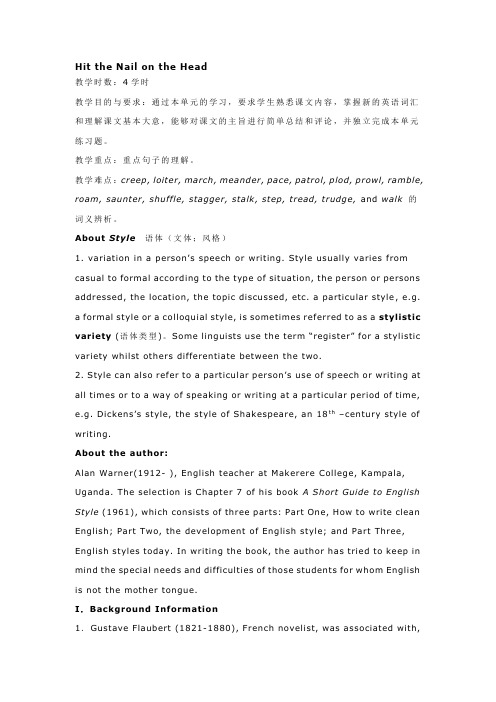
Hit the Nail on the Head教学时数:4学时教学目的与要求:通过本单元的学习,要求学生熟悉课文内容,掌握新的英语词汇和理解课文基本大意,能够对课文的主旨进行简单总结和评论,并独立完成本单元练习题。
教学重点:重点句子的理解。
教学难点:creep, loiter, march, meander, pace, patrol, plod, prowl, ramble, roam, saunter, shuffle, stagger, stalk, step, tread, trudge,and walk的词义辨析。
About Style语体(文体;风格)1. variation in a person‘s speech or writing. Style usually varies from casual to formal according to the type of situation, the person or persons addressed, the location, the topic discussed, etc. a particular style, e.g.a formal style or a colloquial style, is sometimes referred to as a stylistic variety (语体类型)。
Some linguists use the term ―register‖ for a stylistic variety whilst others differentiate between the two.2. Style can also refer to a particular person‘s use of speech or writing at all times or to a way of speaking or writing at a particular period of time, e.g. Dickens‘s style, the style of Shakespeare, an 18th–century style of writing.About the author:Alan Warner(1912- ), English teacher at Makerere College, Kampala, Uganda. The selection is Chapter 7 of his book A Short Guide to English Style (1961), which consists of three parts: Part One, How to write clean English; Part Two, the development of English style; and Part Three, English styles today. In writing the book, the author has tried to keep in mind the special needs and difficulties of those students for whom English is not the mother tongue.I.Background Information1.Gustave Flaubert (1821-1880), French novelist, was associated with,thought not representative of, the movement of naturalism and known as one of the greatest realists of nineteenth-century France. He devoted his life to long hours spent in heavy toil over his work. His writing is marked by exactness and accuracy of observation, e xtreme impersonality and objectivity of treatment, and precision and expressiveness in style, or the principle of the mot juste.2. Mrs. Malaprop is a famous character in Sheridan‘s comedy The Rivals (1775). She is noted for her blunders in the use of word s. ―As headstrong as an allegory (alligator) on the banks of the Nile‖ is one of her grotesque misapplications. She also requests that no delusions (allusions) to the past be made. She has given us the word malapropism as a name for such mistakes.(谢里丹Sheridan,Richard Brinsley, 英国剧作家,政治家。
新编英语教程 5 unit 1

5. Prowl: go about cautiously looking for a chance to get food(as wild animals do), or to steal 6. Strut: walk (about) along, in, out, into a room, etc)in stiff, satisfied way 7. Stalk: walk with slow stiff stride, esp in a proud, self-important or grim way 8. Saunter: walk a leisurely way 9. Shuffle: walk without raising the feet properly 10. Trudge: walk wearily or heavily
Paraphrase: 1. (ll.6-8) A writer who is particular about the exactness of expression in English will never feel happy with a word which fails to express an idea accurately. 2. (ll.15-17) To a certain extent, the process of finding the right words to use is a process of perfection where you try to search for words that may most accurately express your thoughts and feelings, and words that may effectively make your listeners and readers understand your thoughts and feelings.
新编英语教程5(词汇Unit1-10)
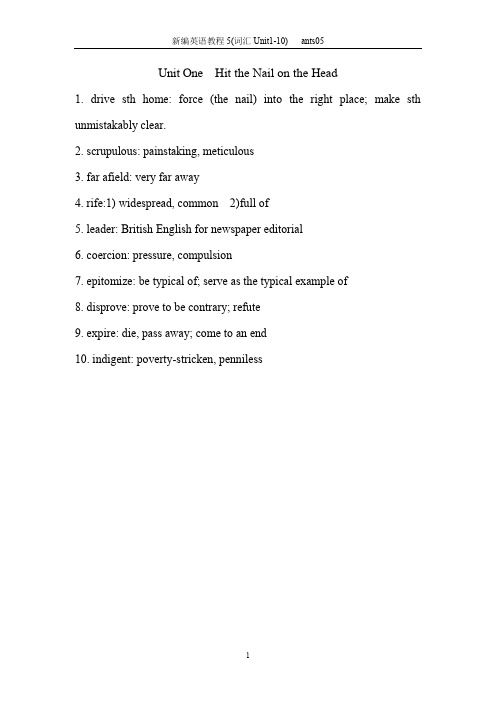
Unit One Hit the Nail on the Head1. drive sth home: force (the nail) into the right place; make sth unmistakably clear.2. scrupulous: painstaking, meticulous3. far afield: very far away4. rife:1) widespread, common 2)full of5. leader: British English for newspaper editorial6. coercion: pressure, compulsion7. epitomize: be typical of; serve as the typical example of8. disprove: prove to be contrary; refute9. expire: die, pass away; come to an end10. indigent: poverty-stricken, pennilessUnit Two Beware the dirty seas1. sluice: (v.) to pour as if from a sluice(水闸),i.e., a man-made passage for water fitted with a gate for stopping and regulating the flow; (n.) a channel controlling water flow2. nurture: further the development of; care for3. evolve: develop gradually (by a long continuous process)4. endemic: (of a disease) found regularly in a particular place5. litany: repetition. The literal meaning of “litany” is “a prayer consisting of a series of invocations and supplications by the leader with responses by the congregation”.6. flush: pour; flood with water to clean out (See dictionary)7. lurk: exist unseen8. effluent: liquid wastes, such as chemicals or sewage that flows out from a factory or some other places into a river or the sea9. plankton: very small forms of plant and animal life that live in a body off water 浮游生物10. slime: unpleasant sticky substance, such as the thick sticky liquid on the skin of various fishUnit Three My Friend, Albert Einstein1. knack: a clever way of doing things2. be in awe of: have respect as well as fear and reverence for3. staggering: unexpectedly surprising; astounding4. vestiges: traces5. ultimately: finally; after a long series of time6. recalcitrant: hard to deal with; unmanageable7. worry: assail a problem again and again until it is solved, just like a dog biting some small animals repeatedly, shaking it or pulling it with the teeth8. surcease: (archaic) cessation, pause9. plausible: seeming to be reasonable10. a house of cards: an insecure scheme11. ineffable: unutterable; incapable of being expressed in words12. elusively whimsical: indescribably quaint or strange 捉摸不透的,古怪Unit Four The Invisible Poor1. perennial: lasting forever or for a long time2. rutted roads: roads with deep, narrow marks made by the wheels of vehicles3. be exempt from: be freed from a duty. service, payment, etc.4. tenement: a large building, especially one in the poor part of a city, which is divided into small flats which are rented cheaply5. affluent: wealthy, prosperous6. compound v.: /kom'paund/ make worse by adding (something) to . . . (often used in the passive)7. existential: relating to human experience (a formal-word)8. lurid: sensational, shocking9. dispossessed: people who have lost all their possessions10. cynical: doubtful as to whether something will happen or whether it is worthwhile11. involvement: connection12. old rhetoric of reform: writings about reform in the past that sounded fine and important, but were really insincere and meaninglessUnit Five The Plug—in Drug:TV and the American Family,PartⅠ1. afflict: trouble2. asset: valuable object; advantage3. preposterous: unthinkable, absurd4. splintering: splitting, breaking up5. the peer group: a group of people of the same age, class, position. etc. here, group of children of the same age6. television-oriented: interested in and influenced by TV7. equivocal: ambiguous8. sorcerer: person who performs magic by using the power of evil spirits9. stint: fixed amount of work: here, the fixed TV programme10. conjure up: bring into the mind11. sane: (in this context) in possession of good relations/of a close bond12. backlog: a reserveUnit Six Preparing for College1. driving motive: the incentive / encouragement that urges them on;2. the rudiments: the basics, the fundamentals (The word rudiments is always in the plural form when used in this sense.)3. metaphysics: the branch of philosophy that deals with abstract concepts, etc. 形而上学,玄学,纯粹哲学4. conscious culture: the culture (i.e. customs, arts, etc,) that is directly perceptible or known to us5. fanatic: one who is very enthusiastic about a particular activity6. personify: express or represent ( a quality in human form)7. sedentary: inactive; done while sitting down8. underline: indicate the importance of9. balked: baffled; frustrated10. a maddening lot: a wild, uncontrollable group11. righteous sects: morally justifiable groups of people whose religious beliefs are considered different form those of a larger group12. relish: 味,味道,兴趣;开胃小菜;great enjoymentUnit Seven Grouping the Gifted:Pro1. innate: belonging to an individual from birth2. pursuit: an activity that one engages in as a profession, vocation, or avocation3. athlete: person who practises athletics; competitor or skilled performer in physical exercises4. heterogeneously: in such a way that members are very different from one another5. criterion /--ia: standard on which a decision may be based6. snob: one who has an offensive air of superiority (here, in matters of knowledge)7. elite: a socially superior group8. instill: put (ideas, etc. ) gradually but firmly into someone's mind by continuous effort9. spark: encourage; stimulate into greater activity10. latent: present and capable of becoming though not now visible or active11. skyrocket: rise or increase rapidly12. pay dividends: produce an advantage. especially as a result of an earlier action (dividend: that part of the money made by a business which is divided among those who own shares in the business 红利)Unit Eight Why Nothing Works1. savant: a man of learning, especially a person with detailed knowledge in some specialized field2. corollary: an immediate inference from a proved proposition3. forestall: defeat, prevent by prior measures4. commitment: a pledge to follow certain beliefs or a certain course of action; devotion (to duty etc. )5. artifact: a usually small object (as a tool or an ornament) showing human workmanship that has special historical interest6. evoke: bring to mind7. projectile point: the tip of a weapon that is thrust forward; spear or arrowhead8. band: a group of people formed for some common purpose and often with a leader9. barter: trade by exchanging one commodity for another10. alienation: a withdrawing or separation of a person from an object or position of former attachment; a feeling of not belonging to or being part of one's surroundingsUnit Nine Where Is the News Leading Us?1. symposium: a conference in which experts or scholars discuss a certain subject2. scrutinize: examine very closely and carefully3. distortion: misrepresentation; a false or dishonest account4. eruptive: (in this context) sensational, shocking, disturbing5. collide with: crash violently into; run into (one another)6. ingredient: a component part of something7. inhibitor: one who holds back, prevents8. deplete: exhaust, use up, reduce9. cynicism: disbelief in the sincerity of human motives10. antidote: remedy, corrective; something that prevents or counteracts11. envision: picture mentally, imagine, visualize12. caricature: a picture ludicrously滑稽的exaggerating the peculiarities or defects of persons or thingsUnit Ten Things:The Throw—Away Society1. Humanoid: having human form or characteristics2. texture: the degree of roughness or smoothness, coarseness or fineness, of a substance or material, especially as felt by touch; visual and tactile qualities of a surface3. staggering: stunning, wondrous, breathtaking4. deride: laugh at contemptuously; to scoff at or mock5. transience: temporariness, impermanence; the quality or state of being temporary or impermanent6. at a rapid clip: (informal) at a fast pace7. inextricably embedded: so deeply involved that it is impossible to get free8. boutique: a small fashionable clothes shop9. sumptuous: expensive and grand10. train: a part of a long dress that spreads over the ground behind the wearer11. A-line dresses: dresses with a flared bottom and close-fitting top, having an "A" or tent-like shape12. supplant: take the place of; replace。
新编英语教程5_unit1_教学课件

2.
3.
4.
2. Have you ever heard of the English proverb ―Hit the nail on the head‖? What does it mean? Suggested Answer (SA): It means exactly right in words or action. (The author advises that the English students should try to get the words, phrases and sentences completely right for their purposes in their writing.) 3. Whose job involves hitting nails? Is the text concerned about the carpenter? Then, what’s the major concern of the author? ( stylistic matter, how to choose the right word from the extensive vocabulary of the English language )
I:
1.
Warm-up questions
Does the title strike you as a bit unusual? Have you ever heard of the English proverb ―Hit the nail on the head‖? What does it mean? Whose job involves hitting nails? Is the text concerned about the carpenter? Then, what’s the major concern of the author? What similarities does the author recognize in the job of a carpenter and the work of a writer?
新编英语教程5UnitTenPPT课件

3
Evaluation
Midterm and final exams to assess student progress.
02 Unit content
Background of the text
01
02
03
04
The text is a story about a group of friends who go on a road trip to a music
Speaking
Role-plays and group discussions on various topics.
Course outline
1 2
Unit 5
Project and Evaluation
Project
Preparation of a short presentation on a chosen topic.
The text includes a variety of phrasal verbs and colloquial expressions that enrich the language and add authenticity.
单击此处添加正文,文字是您思想的为了最终呈 现发布的。单击此处添加正文文字是您思。文字 是您思。单击此处添加正文文字是您思。文字是 您思。4行*21字
李观仪《新编英语教程》第5册 UNIT5
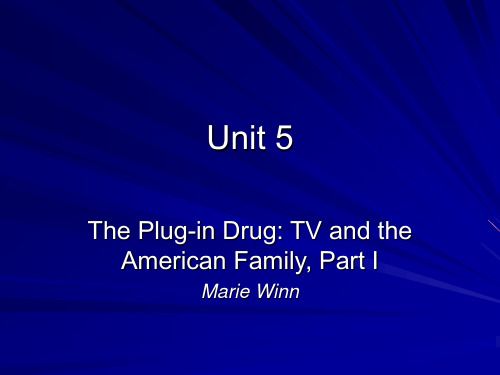
3. Victorian era: Victoria‟s reputation in Britain was also due to her personality. She set a very severe home discipline for her children. Any dishonesty, mischief, negligence or rude language might result in beatings for them. She herself was very careful about her behaviour on public occasions. In addition, she maintained a very harmonious relation with her husband and almost set a standard for domestic virtues of rectitude(正直)of personal conduct. Victoria‟s achievements were so popular in Britain and her personality was so widely esteemed and imitated by the middle class that the epithet Victorian was later applied to any person or time with the characteristics of decency and morality, self-satisfaction based on wealth, conscious rectitude, unquestioning acceptance of authority and orthodoxy, and great industrial and scientific development. Her time was thus called “the polite society” in English history.
全新版大学英语(第二版)综合教程_第五册unit 1
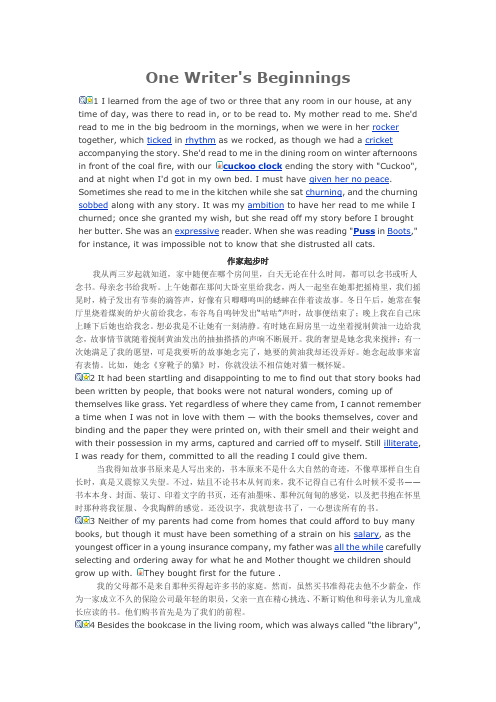
One Writer's Beginnings1 I learned from the age of two or three that any room in our house, at anytime of day, was there to read in, or to be read to. My mother read to me. She'd read to me in the big bedroom in the mornings, when we were in her rocker together, which ticked in rhythm as we rocked, as though we had a cricket accompanying the story. She'd read to me in the dining room on winter afternoons in front of the coal fire, with our cuckoo clock ending the story with "Cuckoo",and at night when I'd got in my own bed. I must have given her no peace. Sometimes she read to me in the kitchen while she sat churning, and the churning sobbed along with any story. It was my ambition to have her read to me while I churned; once she granted my wish, but she read off my story before I brought her butter. She was an expressive reader. When she was reading "Puss in Boots," for instance, it was impossible not to know that she distrusted all cats.作家起步时我从两三岁起就知道,家中随便在哪个房间里,白天无论在什么时间,都可以念书或听人念书。
新编英语教程-5-Unit-1-教案
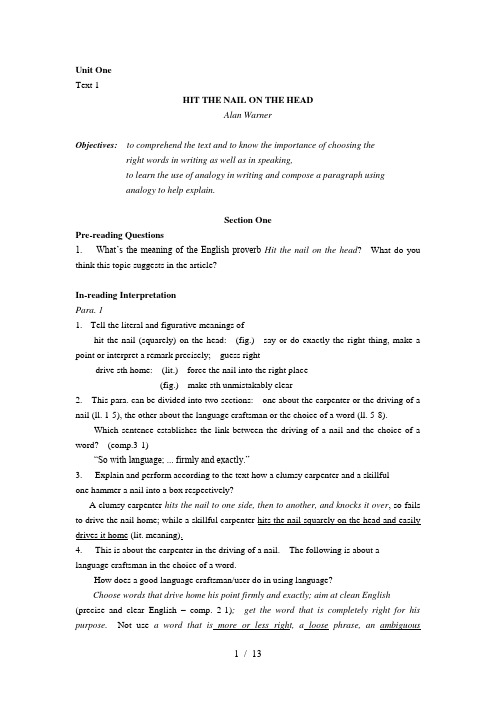
Unit OneText 1HIT THE NAIL ON THE HEADAlan WarnerObjectives: to comprehend the text and to know the importance of choosing theright words in writing as well as in speaking,to learn the use of analogy in writing and compose a paragraph usinganalogy to help explain.Section OnePre-reading Questions1. What’s the meaning of the English proverb Hit the nail on the head? What do you think this topic suggests in the article?In-reading InterpretationPara. 11.Tell the literal and figurative meanings ofhit the nail (squarely) on the head: (fig.) say or do exactly the right thing, make a point or interpret a remark precisely; guess rightdrive sth home: (lit.) force the nail into the right place(fig.) make sth unmistakably clear2. This para. can be divided into two sections: one about the carpenter or the driving of a nail (ll. 1-5), the other about the language craftsman or the choice of a word (ll. 5-8).Which sentence establishes the link between the driving of a nail and the choice of a word? (comp.3-1)“So with language; ... firmly and exactly.”3.Explain and perform according to the text how a clumsy carpenter and a skillfulone hammer a nail into a box respectively?A clumsy carpenter hits the nail to one side, then to another, and knocks it over, so fails to drive the nail home; while a skillful carpenter hits the nail squarely on the head and easily drives it home (lit. meaning).4.This is about the carpenter in the driving of a nail. The following is about a language craftsman in the choice of a word.How does a good language craftsman/user do in using language?Choose words that drive home his point firmly and exactly; aim at clean English (precise and clear English –comp. 2-1); get the word that is completely right for his purpose.Not use a word that is more or less right, a loose phrase, an ambiguousexpression, or a vague adjective. (All the underlined words mean ‘inexact’, ‘inaccurate’.) In other words, a good language user hits the (right) nail on the head and drives his point home (here figuratively).5. A word that is more or less right, a loose phrase, an ambiguous expression, a vague adjective, will not satisfy a writer who aims at clean English (=precise and clear).A writer who is particular about the exactness of an expression in English will never feel happy with a word which fails to express an idea accurately. (LW6-1)or, A writer who wishes to express his ideas precisely will not use the words which are inaccurate. Choose to use those apt vocabularies.Para. 21. What is the meaning of ‘apt’? What does this refer to in The French have an apt phrase for this? (Comp. 3-2) What is the ‘apt phrase’?Apt: well-suited, to the pointThis in the first sentence of the second paragraph refers to the last sentence in the previous paragraph: to get the word that is completely right for this purpose.le mot juste = (French) the correct, right word2. Who is Gustave Flaubert? How much do you know about him? (Lib. W. 1) (refer to [欧洲文学史],(下)pp.140-147) Why does the author say that he is a scrupulous writer?G.Flaubert (1821 - 1880), French novelist, was associated with, though not representative of, the movement of naturalism and known as one of the greatest realists of 19th century France. His masterpieces: Madame Bovary包法利夫人,L’Education Sentimentale情感教育,La Tentation de Saint Antoine圣安东尼的诱惑,纯朴的心He is considered as a scrupulous writer because he spent days trying to get one or two sentences exactly right.He devoted his life to long hours spent in heavy toil over his work. His writing is marked by exactness and accuracy of observation, extreme impersonality and objectivity of treatment, and precision and expressiveness in style, or the principle of the mot juste.2.Why is it so hard to get one or two sentences exactly right?There are many and various words in English language. They are subtle and delicate. They have different shades of meaning and sometimes it is really hard to distinguish the slight differences among synonyms. So it is not enough to have a wide range of vocabulary. We should also know the exact meaning of the words and choose the right words so that we can get our meaning accurately. (ll. 11-15)3. Choosing words is part of the process of realization, of defining our thoughts and feelings for ourselves, as well as for those who hear or read our words. (LW.6-2) realization= fulfilling one’s goal, i.e. to express oneself precisely (comp.2-2)defining our thoughts and feelings for ourselves = getting to know what we are going toexpressfor those who hear or read our words = for our listeners and readers to understand us To a certain extent, the process of finding the right words to use is a process of perfection where you try to search for words that may most accurately express your thoughts and feelings, and words that may most effectively make your listeners and readers understand your thoughts and feelings.Or, Using the right word / le mot juste is one of the stages in the process in which we know our thoughts and feelings clearly and express them precisely, and on the other hand, make our readers and listeners catch what we think and feel accurately. In other words, using the right word can help us to express ourselves exactly, to know what we are going to talk about, and can help our listeners and readers to understand us.4. What’s the meaning of How can I know what I think till I see what I say? Do you think so? Why does the author think it a stupid-sounding question? And why does he think, however, this is true? (Do you agree with the author that there is a great deal of truth in the seemingly stupid question? Why or why not?) (Comp.3-3)It means ‘I can’t get to know my own thoughts before I put them in words.’ (utter it or write it down)Yes, I do. How can a person not know his own thoughts. It sounds irrational that a person does not know what he himself thinks before he sees what he says.This is true in the sense that only after we find the right words to express ourselves exactly can we find our own thoughts clearly. As a matter of fact, it is quite true that unless we have found the exact words to verbalize our own thoughts we can never be very sure of what our thoughts are; without words, our thoughts cannot be defined or stated in a clear and precise manner.Paras. 3 & 41.It is hard work choosing the right words, but we shall be rewarded by the satisfaction that finding them brings.(LW6-3)Finding the most suitable word to use is in no sense easy, but there is nothing like the delight we shall experience when such a word is located.Or, Though it is not easy to find the most suitable word to drive home our points exactly, w e’ll get satisfied / be delighted when we succeed in doing so.2. The exact use of language gives us mastery over the material we are dealing with. (LW 6-4)Once we are able to use language accurately, we are in a position to fully understand our subject matter.Or, Using the apt word indicates that we can fully understand what we are dealing with / talking about.3.Tell the examples in paras. 3 & 4 and the purpose of using them.The example in para. 3 demonstrates: once you are able to find the mot juste to describe the limitation of this fellow, you know what sort of man he really is. (ll.24-5)In other words, the reason why you can’t find the right word is that you don’t have a clear mind of the thing you are going to describe. This example illustrates the point How can I know what I think till I see what I say? in para. 2.So from this example of a man searching for the right word for his feelings about his friend, we know that the function that words perform is to define our thoughts and feelings for ourselves and to define our thoughts and feelings for those who hear us. (comp. 2-3, C) 4. The example in para. 4 indicates the same viewpoint:You will be in a disadvantageous position when someone knows your name but you don’t know his, because he is clear who he is dealing with while you aren’t so that he has the kind of advantage to control you, as the last sentence states: Command of words is ultimately command over life and experience.Paras 5-12In these paras. specific examples are given to demonstrate the significance of hitting the nail on the head in communication. Tell the examples in your own words. Distinguish the following pairs of words and sentences.1. (para.5) Do human and humane mean the same? What are the meanings of human action and humane action, human killer and humane killer?human [`hju:men] = of, characterizing, or relating to manhumane [hju:`mein] = characterized by kindness, mercy, sympathyThushuman action = action taken by manhumane action = merciful actionhuman killer = person that kills humanshumane killer = sth that kills but causes little paine.g. - the Declaration of Human / Humane Right ?- Helping that blind man to cross the street is a very ________ thing to do. (human, humane)- We believe in __________ treatment of prisoner. (human, humane)humanity: mankind, human nature, quality of being humanehumanism, humanist, humanitarian; humanizeTheir origin is the same and their meanings are related, but their usage is distinct. i.e. They are of the same origin / root, but of semantic difference.2. (para.6) What is the difference in meaning or usage between anxiety and eagerness?anxiety = a kind of worry and fear about sth that will / is likely to happen in the future.eagerness = sort of desire or wishThey have some kinship with each other, but cannot be substituted by each other.e.g. - My anxiety grew when my 7-year-old son hadn’t returned by nightfall.- Not knowing whether or not he would be admitted to the university caused the whole family great anxiety.- When the box of chocolate is passed around, David is waiting with intense eagerness.- Her hands trembled with anxiety / eagerness as she opened the letter. (different senses with different words)3. (paras. 7, 8) What’s the difference between singularity and singleness?singular = outstanding and extraordinary, very strange and peculiar, uncommon (denotation)singularit y = oddity, peculiarity, sth. that singles a man out from other mensingle = only one and no more, solitary, separate, individuale.g. - singular behavior / dress / opinion- single-minded: steadfast or firm to the purpose in mind, / single dressThese two words also have the same root but different senses.4. (para. 9) Look at the sentence All that was ever thought or written about Christmas is imprisoned in this sentence... Why is imprisoned not the “mot juste”? Why are the words contained, summed up, epitomized and distilled better than imprisoned in this sentence?The word imprison‘suggests to put in with force, coercion (pressure, compulsion) as if the meaning were held against its will.’ (l.59)Contain and sum up are more commonly used.Epitomize has the same semantic meaning with contained and summed up, but it is rather a clumsy-sound word, because it is too academic, more formal, so inappropriate in this informal context.Distill means to leave out the impurities and make purifying essence (e.g. distilled water), so the essence of the meaning of this sentence can be better expressed in the following sentence: The essence of all that was ever thought or written about Christmas is distilled in this sentence.5.(para.10) Tell the differences betweenIn my childhood I loved to watch trains go by.When I was a child I loved watching trains go by.and He died poor.He expired in indigent circumstances.a. At first glance these two sentences are exactly the same. But look more closely and you will see that there are very tiny differences.in my childhood - more abstract than when I was a childwatching - more emphasis on the action of looking at trains than to watchin one’s childhood / adolescence / youth / adulth ood / old agesb. He died poor.He expired in indigent circumstancesThese two sentences are of similar lexical interpretations, but the feelings each of them gives the reader are quite different since the words are changed. The first is a rather common statement, nothing special is contained in it while the latter epitomizes strong emotion, which may arouse the reader a kind of sympathy. So The change in words is a change in style, and the effect on the reader is quite different, as Prof. Ralei gh stated:’ There are no synonyms, and the same statement can never be repeated in a changed form of words.’Therefore, as para.10 concludes, we should ‘increase our skills’ in using the right word for our purpose and increase our ‘sensitivity’ with the sh ades of difference in vocabulary.Section Two6.(Para.11) The study of words, of their origins and shifting meanings, can tell us agreat deal about human life and thought. It is difficult and sometimes impossible to translate a word from one language into another. Why? Supply some such examples with English and Chinese. (comp.3-7)Those are words denoting notions which are existent only in specific cultures, not universally shared by all cultures.English words difficult to be turned into Chinese: privacy, party, lobby(v.), highlight, etc.Chinese words difficult to be turned into English: 吹风会,粽子,五保户, 五讲四美,etc.Comp. 2-5: The examples of untranslatability of some words given in this para. Best illustrate: the 3rd sentence7. (Para.12) Another reason for increasing our skills and sensitivity is that: there are many synonyms in English language, i.e. different words bearing the similar meaning.LW1, 2 & 48.What do all these specific examples serve in this article?to support the main ideas. Remember the title is Hit the nail on the head, a proverb which indicates here to use the exact words to express oneself, or to express your right meaning by using the precise words.Para.13What does the writer conclude in the last paragraph? Retell this paragraph in your own words.Better know two words exactly than three vaguely.Post-reading Discussion1.Can you draw the main ideas of this article?One must be able to choose the right word from the extensive vocabulary of the English language to facilitate one’s own process of cognition and one’s communication with others. (Comp. 1-B)Section ThreeAnalysis1.Encourage the students to make their presentation on analogy. (10 mins.)What is an analogy? What’s the a dvantage of using it / when is it necessary to use it? Illustrate it by analyzing the text or give your own examples.Analogy is a special kind of comparison and a more concrete way to explain things. Like comparison, analogy shows similarities, but unlike comparison, analogy aims at what is common between two things of different classes. e.g. (P.7)We are likely to turn to an analogy to bring it to life when we have to explain sth vast, remote, abstract or specialized. e.g. (P7)2. Ask the whole class to identify the places where the analogy is referred to in the article. (Comp.3-8) (10 mins.)3. Supply more analogies showing the use of analogies. (10 mins.)Suppose you are going to write a passage discussing the learning of a foreign language. Use an analogy to help you explain. (LW 7)Text II The Maker’s Eye: Revising Your Own ManuscriptsDonald M. MurrayQuestions for individual pre-class work:1. What difference is there between the professional writers and the amateurs? What does Murray mean by Writers must learn to be their own best enemy? (paras. 1, 2, 3, 4)A professional regards the 1st draft as the beginning of the job, ‘the 0 draft’, never finishedAn amateur as the end of the job, done, finishedWriters must learn to be fastidious and exacting, i.e., severely critical with their own writing.2.What does a professional writer usually do when finishing his first draft? Identify thesenten-ces in paras. 2-6.(para. 2) discover what they have to say and how best they can say.(para. 3) say more and say it more clearly,change and rearrange the words to avoid confusionand clarify meaning(para. 4) accept criticism and praise of others and be suspicious of it(para. 5) detach themselves from their own pages, then reread hem as strangers(para. 6) be critical of everything, be passion-hot and critic-cold simultaneously(para. 8) be critical and constructive simultaneously, to cut what is bad and to reveal what is good so that in the end the writing still maintains its original freshness and spontaneity.3.What is the problem arising for the writers doing these kind of work and for the majorityofstudents? (para. 7)They are overly too critical to complete a draft, tear up page after page, think everything dreadful, see the task as hopeless4.What are the possible ways of rewriting for writers? (paras. 11-2)A few writers seem to do little rewriting, but they create and review the invisible drafts in their minds before approaching the page.Some writers revise page by page.Most writers revise draft by draft, catching the larger problems of subject and form, then moving in closer and closer.5. What are the 8 points that M. thinks writers must consider when revising their drafts? How do you explain them?Information, meaning, audience, form, structure, development, dimension, voice. Refer to paras.13-20.6. What else does M. think a writer should do in revising apart from these 8 points?(para.21) Line-by-line editing. Study individually all the clauses, phrases, words, and even the punctuation marks.(para. 22) once a word is changed, … all the words used … must be considered and reconsidered.(para. 23) read aloud / mutter to himself part of his manuscript at a certain stage of revising, because our ears are very good judges of language, being sensitive to the flow of words. What is right should sound right, and what sound right should be right.(para. 25) choose the precise word for words have double, triple, even quadruple meanings.(para. 26) from word to phrase to sentence to paragraph, then backward, to achieve variety, balance, coherence, unity, emphasis, firmer structure and appropriate form7. How does M. End his essay? Comment on the way M. concludes his essay. (para. 30)The apparently unfinished essay is a good illustration of his idea that a piece of writing is never really finished, it can always be re-read, and re-written, with sth deleted and sth added. 8. What will you be benef ited in your writing practice if you follow M’s suggestions?Group work and class presentation:Gp1: Work out a presentation of paras. 1-12 based on questions 1-4.Gp 2: Work out a presentation of paras. 13-26 based on questions 5-6.Class discussion on Qs. 7-8.Questions on TEXT II, UNIT I for pre-class work:1. What difference is there between the professional writers and the amateurs? What does Murray mean by Writers must learn to be their own best enemy? (paras. 1, 2, 3, 4)2.What does a professional writer usually do whenfinish-ing his first draft? Identify the sentences in paras. 2-6, 8?3.What is the problem arising for the writers doing these kind of work and for the majority of students? (para. 7)4.What are the possible ways of rewriting for writers? (paras. 11-2)5. What are the 8 points that M. thinks writers must consider when revising their drafts? How do you explain them? (paras. 13-20)6. What else does M. think a writer should do in revising apart from these 8 points?(paras.21-6)7. How does M. End his essay? Comment on the way M. concludes his essay. (paras. 27-30)8. What will you be benefited in your writing practice if you follow M’s suggestions?Unit 1-1Para.1--- Comp. 2-1, 3-1--- Tell the literal and figurative meani ngs of ‘hit the nail on the head’ and ‘drive sth home’.Para. 2--- Comp. 2-2, 3-2, 3, LW6 – 2--- Who is Gustave Flaubert? How much do you know about him? Why does the author say that he is a scrupulous writer?Para. 3--- Comp. 2-3, LW6 – 3, 4--- What does the example in para. 3 demonstrate? Para. 4--- Why will you be at a slight disadvantage if someone knows your name but you don’t know his?Paras. 5-10--- Distinguish the following pairs of words andsentences and explain what the author demonstrates by making all these examples.- human & humane, anxiety & eagerness, singularity & singleness,- imprison & contain, sum up, epitomize, distill - In my childhood I loved to watch trains go by. & When I was a child I loved watching trains go by.- He dies poor.& He expired in indigent circumstances. Para. 11--- Comp. 2-5, 3-7Para. 12--- Make a careful distinction among the words given in para. 12 and complete LW1.Para. 13--- What does the author conclude in the lastparagraph?e.g. The writer, at the conclusion, uses repetition and parallelism to drive home the thesis so that no one who has read this article can ever forget.1. hit the (right) nail on the head / hit it = guess right, say or do exactly the right thing, make a point or interpret a remark preciselye.g. - Jane’s father hit the nail on the head when he said that her chief fault was vanity.- The report spoke of corruption, which hit the nail squarely on the head.- You’ve hit it.[文档可能无法思考全面,请浏览后下载,另外祝您生活愉快,工作顺利,万事如意!]。
新编英语教程5_课文+翻译(unit1~15)(学生必备)
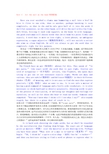
Unit 1 hit the nail on the head 恰到好处Have you ever watched a clumsy man hammering a nail into a box? He hits it first to one side, then to another, perhaps knocking it over completely, so that in the end he only gets half of it into the wood. A skillful carpenter, on the other hand, will drive the nail with a few firm, deft blows, hitting it each time squarely on the head. So with language; the good craftsman will choose words that drive home his point firmly and exactly. A word that is more or less right, a loose phrase, an ambiguous expression, a vague adjective(模糊的形容词), will not satisfy a writer who aims at clean English. He will try always to get the word that is completely right for his purpose.你见过一个笨手笨脚的男人往箱子上钉钉子吗?只见他左敲敲,右敲敲,说不准还会将整个钉子锤翻,结果敲来敲去到头来只敲进了半截。
而娴熟的木匠就不这么干。
他每敲一下都会坚实巧妙地正对着钉头落下去,一钉到底。
语言也是如此。
新编英语教程第三版第五单元课件
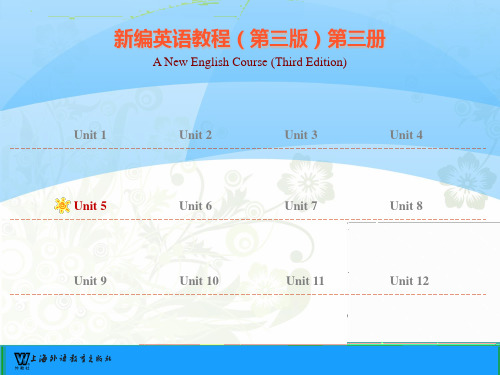
Movie Clip Quotes
新编英语教程(第三版)第三册
Unit 5 On Not Answering the Telephone
unit2unit3unit1unit4新编英语教程第三版第三册新编英语教程第三版第三册anewenglishcoursethirdeditionunit6unit7unit8unit9unit10unit5unit11unit12unit5onnotansweringthetelephoneleadleadininlisteninginandspeakingoutlisteninginandspeakingouttextoralworkguidedwritingcomprehensiveexercisestextoralworkguidedwritingcomprehensiveexercisesmovieclipquotesquotes新编英语教程第三版第三册unit5onnotansweringthetelephoneleadlead
新编英语教程(第三版)第三册
Unit 5 On Not Answering the Telephone
Lead-In Listening In and Speaking Out Text Oral Work Guided Writing Comprehensive Exercises
- You OK? - Yeah. - ... and pairs auditions for our two leads. - Pfft. - Mr. Danforth, this is a place of learning, not a hockey arena. There is also a final sign-up for next week’s scholastic decathlon competition. Chem Club president Taylor McHessey can answer all of your questions about that. Ah, the cell phone menace has returned to our crucible of learning. - Is it your phone?
新编英语教程5unit1修辞手法之analogy

Hale Waihona Puke 1. The chessboard is the world; the pieces are the phenomena of the universe; the rules of the game are what we call the laws of Nature. The player on the other side is hidden from us. We know that his play is always fair, just and patient. But also we know, to our cost, that he never overlooks a mistake, or makes the smallest allowance for ignorance. To the man who plays well, the highest stakes are paid, with that sort of overflowing generosity with which the strong shows delight in strength. And one who plays ill is checkmated without haste, but without remorse. (T. H. Huxley)
2. Take an aerial photograph of Manhattan and reduce it three million times. You now have something that resembles the circuit of 6000-plus transistors that must be imprinted on a silicon wafer one seventh of an inch square. Cover each transistor with a layer of insulation and connect them all with a thin path of aluminum. If there is a single defect, equivalent in scale to a one-foot pothole in the streets of Manhattan, the whole chip will be useless.
- 1、下载文档前请自行甄别文档内容的完整性,平台不提供额外的编辑、内容补充、找答案等附加服务。
- 2、"仅部分预览"的文档,不可在线预览部分如存在完整性等问题,可反馈申请退款(可完整预览的文档不适用该条件!)。
- 3、如文档侵犯您的权益,请联系客服反馈,我们会尽快为您处理(人工客服工作时间:9:00-18:30)。
by confusing it with one that resembles it, such as human for humane, singularity for singleness.
3. Hindi(印地语)is a literary and official language of northern India. Swahili(斯瓦希里语)is a Bantu(班图) language that is a trade and governmental language over much of East Africa and in the Congo region. Bantus are people belonging to a group of tribes found in equatorial and southern Africa.
4. Wrong choice of words caused by failure to recognize their connotations (Paragraph 8) Examples: imprison, contain, sum up, epitomize and distill 5. Stylistic differences between synonyms (Paragraph 9)
II. Library Work 1. Gustave Flaubert (1821 – 1880), French novelist, was associated with the movement of naturalism and known as one of the greatest realists of 19th-century France. He devoted his life to long hours spent in heavy toil over his work. His writing is marked by exactness and accuracy of observation, extreme impersonality and objectivity of treatment, and precision and expressiveness in style, or the principle of the mot juste.
III. Organization of the Text
1. An analogy between the unskilled use of the hammer and the improper choice of words (Paragraph 1) 2. The significance of finding the right words (Paragraphs 2 --- 3)
4. vague: unclear in meaning because it‟s expressed in indefinite form or because it reflects imprecision of thoughts.
E.g., (1)„What‟s happened?‟ „Oh, a lot of things.‟ She said vaguely. (2) My plans are very vague. 我的计划非常含糊。
Paragraph 2
Question
2: Do you agree with the author that there is a great deal of truth in the seemingly stupid question “How can I know what I think till I see what I say”? Why or why not?
Paraphrase 1
A word that is more or less…at clean English.(para.1)
A writer who is particular about the exactness of an expression in English will never feel happy with a word which fails to express an idea accurately.
Hit the Nail on the Head
Alan Warner
I. Pre-reading Questions
Have you ever hit a nail into a box? What‟s the correct way of doing it? Can you see the connection between the proverb and our writing?
(4). 为了阐明他的政策,总统又写了第
(5).你必须使约翰明白我们钱确实不够。
You must drive it home to John that we don’t have enough money.
2.deft: skillful & quick熟练的,灵巧的
E.G.,(1) She is deft at dealing with reporters. 她善於与记者周旋.
3. Semantic differences between words having the same root (Paragraphs 4 --- 7) (1). Example 1 (human vs. humane) (Paragraph 4) (2). Example 2 (anxiety vs. eagerness) (Paragraph 5) (3). Example 3 (singularity vs. singleness) (Paragraphs 6 – 7)
Suggested Answers
Force the nail to the right place
It means exactly right in words or action E.g. : (1). Your criticism really hit the nail on the head. 你的批评确是一针见血。 (2). In so saying, you hit the right nail on the head. 你 这样说确是击中要害。
2. Mrs. Malaprop is a famous character in Sheridan‟s comedy The Rivals (1775). She is noted for her blunders in the use of words. She has given us the word malapropism(as a name for such mistakes. 用词错误,尤指误用发 音相似而意义全非的词) i.e., the unintentional misuse of a word
IV. Key Points of the Text 1.drive something home: force (the nail) into the right place; make something unmistakably clear 把(钉 子等)打入;使明确无误 E.g. (1). He slammed the door and
drove the bolt home. 他砰地关上门,把 门闩插好。 (2). drive one‟s point home 讲清楚自己 的观点
二封信。 To drive home his policy, the president wrote his second letter.
2)
thorough, exact and pays careful attention to detail
E.G., The nurse treated him with the most
scrupulous care. 那位护士悉心尽力地照料他。
ቤተ መጻሕፍቲ ባይዱ
unscrupulous: 不择手段的, 肆无忌惮的, the opposite of scrupulous, seems to be more often used to describe people who do not care about honesty and fairness in getting what they want, or who are completely without principles.
(2) The deft fingers massaged his scalp.
3. ambiguous: be confusing because it indicates the presence of two or more possible meanings.
Eg., (1) Frustrated by ambiguous instructions, the parents were never able to assemble the new toy. (2) The wording of the clause is ambiguous and needs clarification 该条款的措词模棱两可,需要澄清
5.Scrupulous
1)
Take great care to do what is fair, honest, or morally right.
E.g.,The paper was not entirely scrupulous in setting out its assumptions. There‟s a lot of pressure on manufacturers to behave scrupulously.
